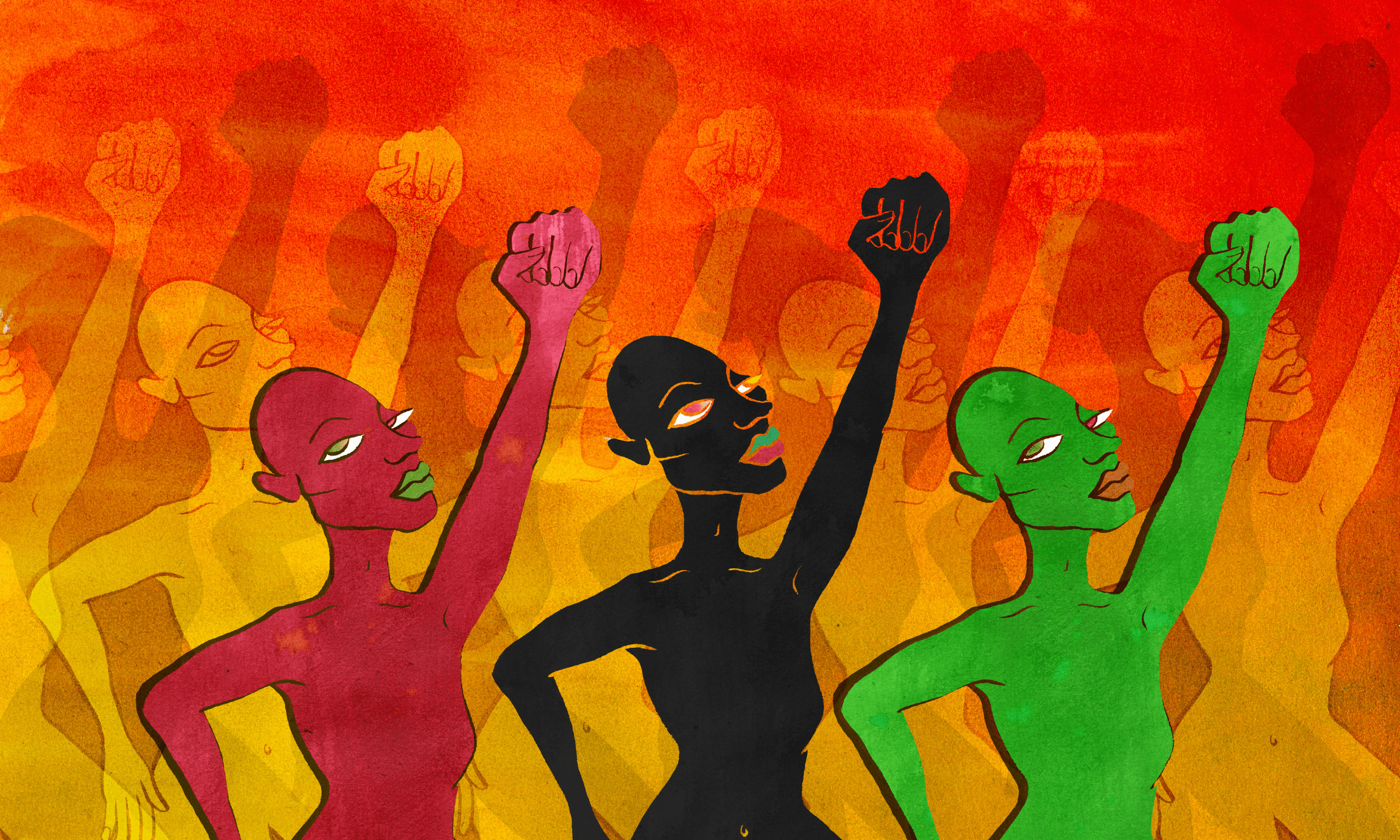
Illustration by Alice Jones
Growing up in Ireland as the only child of colour in my school, housing estate, village, youth club, and any space I entered until the age of about 13, I used to eagerly await seeing my Mum’s side of the family. It was only when we got together in England that I’d ever get the chance to blend in. When my white father attended these events with us, I was given the chance to witness whiteness as a novelty.
I remember at one such event two little girls asking my father to say something in Irish. Dad obliged by rolling out the same go-to stock Gaelic phrases every Irish person has ready to hand when landing on new soil: Conas atá tú? Is maith liom cáca milis. But he was met with a sort of bewilderment close to disgust. They had simply meant the queen’s English spoken with a foreign accent, and were oblivious to the fact the Irish had not always spoken the language of their colonisers. But of course, the UK does not teach its children about the culture of the countries before the empire.
Once, when I was explaining my heritage to someone (an almost daily occurrence) I was asked what language my mother spoke. I explained that Antigua is an English-speaking Island, assuming they wondered if perhaps it was a Spanish colony given the name. When they pried further about the “native language”, I realised they didn’t understand its history of slavery, and was tasked with explaining how it’s current inhabitants came to be there.
“When someone pried about Antigua’s ‘native language’, I realised they didn’t understand its history of slavery”
But why is it our burden to carry this knowledge of the system that oppressed us, of which its beneficiaries can choose to remain ignorant? For people living in Britain today racialised as black, we cannot escape this truth, we wear on our skin and our hair and carry the trauma in our genes.
It is this colonial duality that caused me to be so abashed when during my first teaching post one of my year 12 students said they had never encountered the word “colonialism”, despite having studied GCSE history. I suddenly got that same feeling I had growing up – constantly having to explain my existence to people who demanded to know where I was “from from”. This was the same teaching post where dress codes equally worked to exclude students of colour – “multiple plaits”, which obviously refers to braids or canerows, were explicitly banned.
It was not unusual for students to have little to no understanding of colonialism, those who had a keen interest in history were more knowledgeable yet still not fully aware of its continual implications. Only a minuscule portion of the history curriculum is given to colonialism, and the history of colonised countries before the empire is ignored. Yet I do not think that the history department should be solely responsible for imparting this knowledge, to assume this is othering and implies colonial attitudes have been left in the past.
Schools do the minimum required to address ethnocentrism – by serving halal food in the canteen and quoting Martin Luther King Jr. during Black History Month they feel they have fulfilled their duty. Our histories and interests are being overlooked because we are being systematically kept out of positions of influence. The diverse nature of this country is not reflected in its educators, only 13.8% of teachers are from a minority ethnic background, and this number only decreases the further up the chain of command you go. Diversity is also something students are taught to tolerate, rather than celebrate. Schools are expected to allocate time to the teaching of British values, but the things that make Britain what it is today cannot be considered separately from its colonial acquisitions.
“One of my year 12 students said they had never encountered the word ‘colonialism’, despite having studied GCSE history”
Those of us bothered by the ethnocentric curriculum usually turn our attention to humanities subjects. When sociology students learn about ethnicity and educational achievement, the fact that black students, particularly black Caribbean, do not perform as well as other groups is attributed to the idea that they are more likely to be materially and “culturally deprived”. The difficulty in reaching the highest paid jobs in society is ignored, and the concept of a lack of culture is merely insulting.
Maths and other STEM subjects also have their problems. A former biology teacher and examiner told me of students who had lost marks in exams because they had referenced sickle cell disease instead of the one suggested in the specification; although their answer was technically correct it was not indicated in the mark scheme and examiners without a profound knowledge of biology may not have picked it up. Sickle cell disease is most common in people of African descent, many black students would be familiar with the disease as a family member may be a sufferer. This may seem like a pedantic point to some but to me, it demonstrates how things that predominantly affect people of colour are of little interest to the institutions of this country.
There has been a push towards “inclusivity” in education – schools make a show of sporadically holding diversity days that span all minority groups. But why is this exclusively extra-curricular? There are abundant opportunities throughout the national curriculum to represent the diversity of the population.
We cannot achieve liberation when our histories are not equally honoured; any teaching of colonialism that does happen tends to legitimise the actions of the British Empire. This isn’t necessarily direct, but any omission of the atrocities of the empire only works to glorify it. “Australia Day” and “Canada Day” have been heavily protested in their respective countries as they signify the beginning of a long history of systemic oppression. But how do we protest the homage to empire happening in our classrooms every day?









